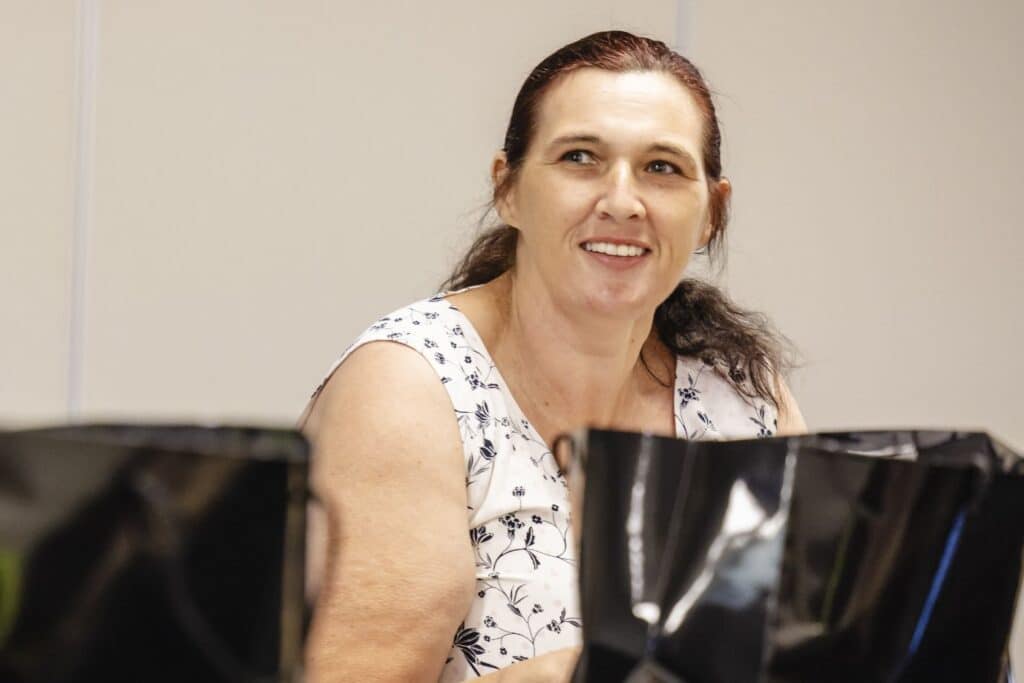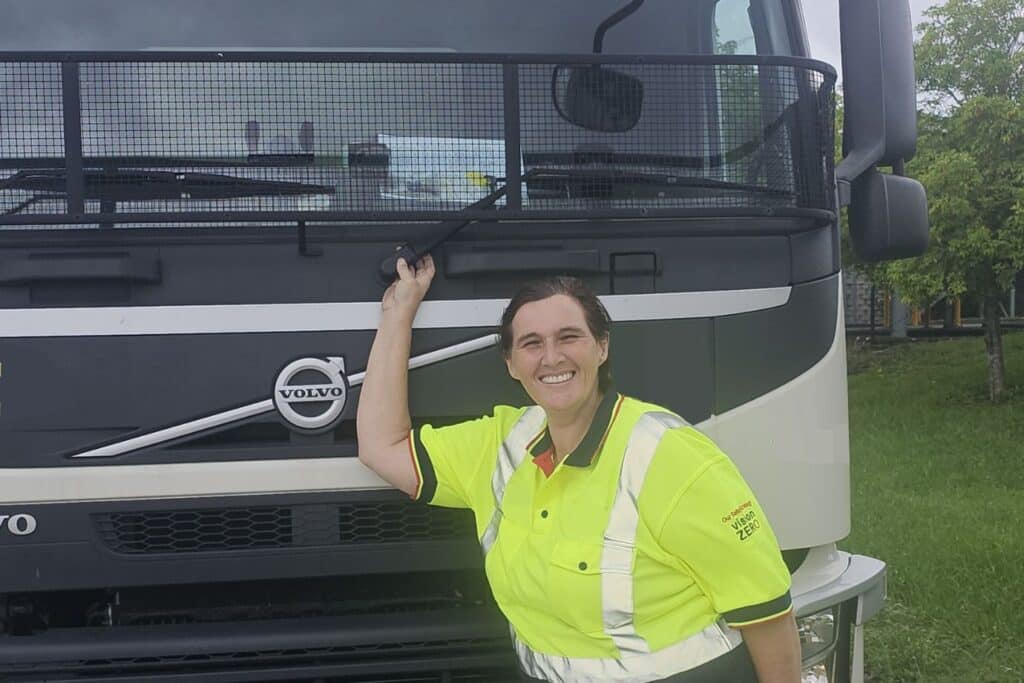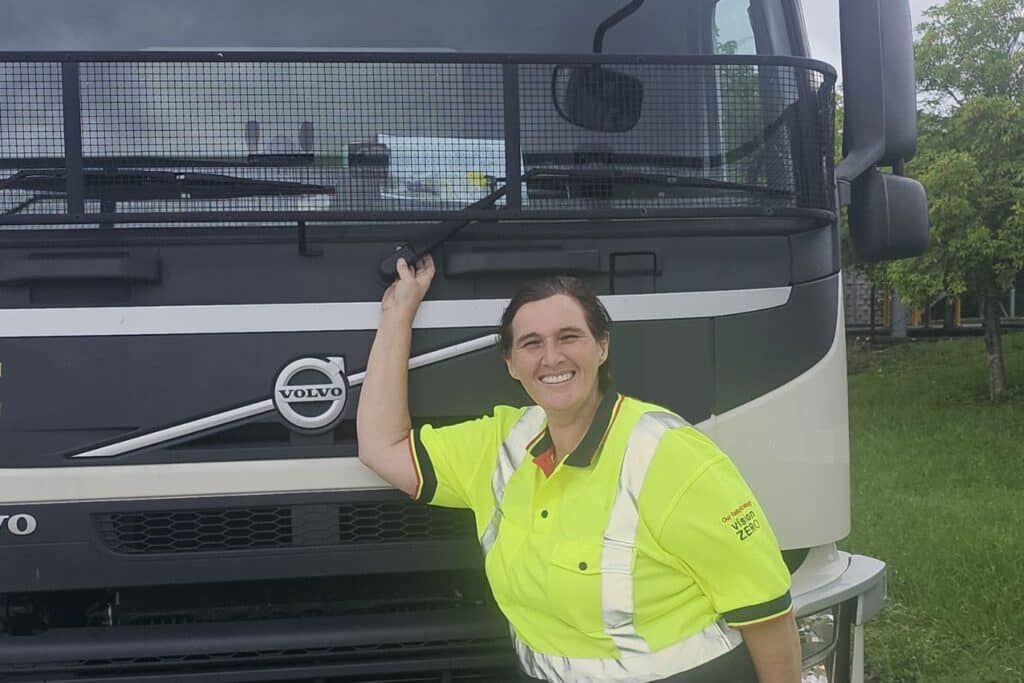Just a few months ago, Kathy Graham sat in the driver’s seat of a truck for the first time. When she turned the engine on, the whole vehicle wobbled, the noise engulfed the tiny space, and she nearly gave up.
Driving it on a two-lane country road in Barnawartha in regional Victoria wasn’t any easier. At one point in her first drive, another truck started barrelling towards her.
Kathy’s mind echoed the words of her dad, who used to tell her how powerful trucks are – and the damage they can do should you get on the wrong side.
When she shared her fear with her driving instructor, he had one thing to say to her.
“Kathy, you are a truck.”
A mere three months after passing her truck driving test, 48-year-old Kathy is driving trucks all around the country. She’s one of the very few women in Australia doing so: just three per cent of truck drivers are women, according to government statistics.

It’s also the most freedom, control and empowerment Kathy has ever had in her life, after she escaped from an abusive relationship. Her new job is a way to take her mind off her past trauma, put the foot on the pedal and leave it behind in the rearview mirror.
“You have control (in a truck) – with domestic violence, you don’t have any control. You never know when they’re gonna go off. You never know whether you’re gonna get a black eye. You never know whether you’re gonna end up in hospital.
“Now, with this truck, I have more control over my life.”
How did it start?
Twelve years ago, Kathy’s violent and abusive relationship came to a head when she was shot in the hip by her perpetrator. He was jailed for 18 months, but Kathy has done more time recovering from the incident than he ever spent in prison.
“It really affected my life,” Kathy said.
“It’s probably not until the last 2-3 years I’ve actually started living again – starting to get counselling, work, that type of thing.”
Kathy worked as a baker for Woolworths, but with her ongoing injury, she could never return to full-time work. But an advertisement for a truck driving program, specifically targeted at women, changed everything.
“I have no experience with trucks whatsoever. But I do like driving. It’s a form of freedom and escape. When you’re driving, and you put the music on, you don’t really think,” Kathy said.
In November last year, upon seeing the ad for the Iron Women truck driving program, Kathy signed up for the three-week course. After all, how hard could it be?
It turns out, there’s a lot more to driving a truck than meets the eye. Kathy participated in two weeks of classroom theory, then had one week of on-road heavy vehicle training.
But she passed the course and passed the driving test. Now, Kathy works as a truck driver for a major transportation company in Australia – and she couldn’t be happier.
Women in the industry
According to the Australian government’s Labour Market Insights, just three per cent of truck drivers in the country are women.
The stats stack up for Kathy: when she spoke to Women’s Agenda, she was at work and observed the other truck drivers in the lot.
“There’s probably about 100 trucks here all waiting to be taken out,” Kathy said, “and there’s only two females here.”

According to research from Volvo Trucks, 76 per cent of women have never even considered a career in truck driving.
The research found a third (33 per cent) of women are hesitant to pursue a career in truck driving because of the “blokey culture”. Meanwhile, 34 per cent are worried about being physically strong enough.
While women might feel uncomfortable breaking into the business, nothing changes without women like Kathy taking charge – and it might just change their lives, like it did for her.
“It’s important we get more women in here to change the dynamics,” Kathy said.
“But also give women the opportunity to gain a skill, to gain employment, to gain purpose and meaning.
“You never know what you’re gonna get out of life until you give it a go.”
If you or someone you know is experiencing, or at risk of experiencing, domestic, family or sexual violence call 1800RESPECT on 1800 737 732, chat online via 1800RESPECT.org.au or text 0458 737 732.
If you are concerned about your behaviour or use of violence, you can contact the Men’s Referral Service on 1300 766 491 or visit www.ntv.org.au.
Feeling worried or no good? No shame, no judgement, safe place to yarn. Speak to a 13YARN Crisis Supporter, call 13 92 76. This service is available 24 hours a day, 7 days a week.
In an emergency, call 000.


